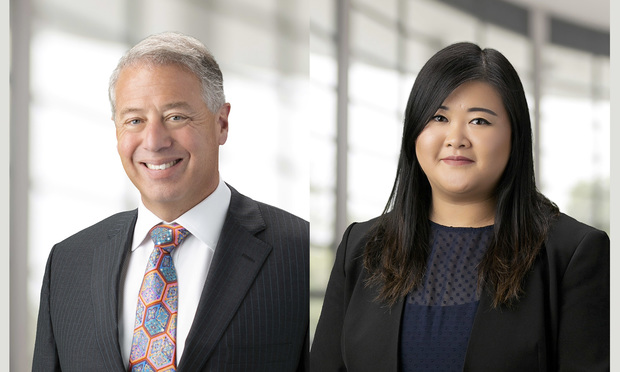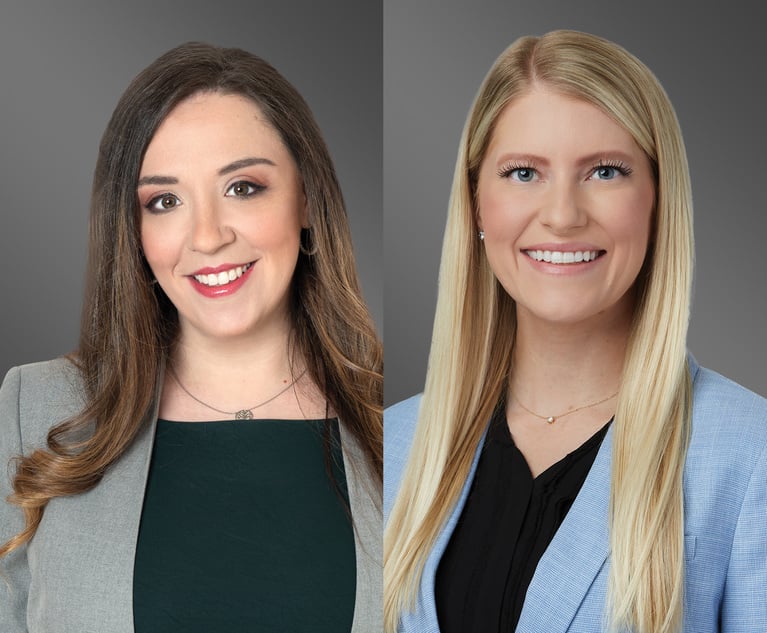Cybersecurity Challenges for Remote Law Firms
Employees working from home are particularly vulnerable to phishing scams due to human errors and often have weak security protocols on their Wi-Fi networks, allowing hackers easier access to the network's traffic.
June 11, 2020 at 03:46 PM
5 minute read
 Brian S. Kabateck and Joana Fang of Kabateck LLP.
Brian S. Kabateck and Joana Fang of Kabateck LLP.
In the COVID-19 era, law firms face numerous cybersecurity challenges and vulnerabilities from lawyers and legal staff working remotely. Employees working from home are particularly vulnerable to phishing scams due to human errors and often have weak security protocols on their Wi-Fi networks, allowing hackers easier access to the network's traffic. In fact, on March 13, the U.S. Department of Homeland Security Cybersecurity and Infrastructure Security Agency recognized these issues encouraged those that are moving to remote working status "to adopt a heightened state of cybersecurity," because of the significantly elevated risk of malware, phishing attacks and ransomware demands amid the coronavirus pandemic.
The most important goal for a law firm is to protect its data. If a firm does not have the right cybersecurity system set up, it may have to deal with a ransomware attack. This is exactly what happened last month in May, when the law firm of Grubman Shire Meiselas & Sacks, recognized as one of the premier entertainment and media law firms in the country, was hit with a data extortion scheme. A cybercriminal ring claimed to have stolen from the firm approximately 756 gigabytes of private documents and correspondence. The hackers alleged they have possession of information on the law firm's clients past and present, including Lady Gaga, Madonna, Nicki Minaj, David Letterman, John Mellencamp, Robert DeNiro, Elton John, the Kardashians, and even companies like Facebook, Activision, iHeartMedia, IMAX, Sony, HBO and Vice Media.
The hackers issued a ransom demand of $21 million to the law firm and threatened to gradually release the stolen data if they do not receive payment. After the firm refused to pay, the hackers delivered on their threat as 2.4 gigabytes of data related to Grubman Shire client Lady Gaga was released. Some other leaked files have included contracts, telephone numbers, email addresses, personal correspondence with the lawyers related to various case files, and nondisclosure agreements made with advertising and modeling firms.
The breach not only subjects the firm to major liability to their clients, the firm may also be found to violate its ethical responsibilities under the American Bar Association's Model Rules of Professional Conduct. Certain violations of the rules may even lead to disciplinary proceedings and all violations mean that the lawyers have not met the expectations of their clients or themselves. For example, Rule 1.6 is the confidentiality provision. The prohibition is absolute, because the rule says that attorneys shall not disclose such information relating to the representation of a client unless the client gives informed consent or the disclosure is impliedly authorized to carry out the representation, or is otherwise permissible under Rule 1.6. Rule 1.6 implies that disclosure can be either intentional or accidental. Subsection (c) states that every lawyer shall make "reasonable efforts to prevent the inadvertent or unauthorized disclosure of, or unauthorized access to, information relating to the representation of a client." There are several factors to consider, including the economic and noneconomic costs of the security protocol (e.g., a software system that has so many security layers that it is difficult to use), the nature of the information, and the likelihood of disclosure.
As shown, the combination of flawed technology and human errors make the home office a cybersecurity concern. Employees use their own personal computers and at-home Wi-Fi networks that are not as strong as the security, firewalls and routers at the office that firms invest in. Distractions while working from home, such as child care, roommates and not having a desk set-up like they would at the office, are having an impact on how people operate. In some cases, security policies are too much of a barrier for employees working from home to adapt to, especially if they are under pressure to hit deadlines.
Law firms thus need to address these vulnerabilities and take steps to keep their data and files secure. For example, the law firm's information technology department should have the resources they need to meet the business needs and keep the data secured. If the law firm issues computers or phones, the law firm should ensure that they are properly configured and have updated software. If the employees use their computer, they should use encrypted hard drives and virtual private network with passwords for connecting. Security experts should be consulted to create a set of policies and procedures that remote workers should follow when using the computer and accessing the network.
Additionally, all employees should be taught what to look for in phishing and malware schemes and other cyberthreats connected to the COVID-19 outbreak. All remote workers should also be provided with a list of emergency contact numbers and have them ready in case of a data breach so the IT department can handle them immediately. By taking proactive steps, law firms are ensuring that they are taking enough precautions to prevent any cyberattacks from bad actors taking advantage of this pandemic.
Brian S. Kabateck is a consumer rights attorney and founder of Kabateck LLP in Los Angeles. He represents plaintiffs in personal injury, mass torts litigation, class actions, insurance bad faith, insurance litigation and commercial contingency litigation.
Attorney Joana Fang is an associate with the firm and a member of its trial team. Fang handles a wide range of cases for the firm, including consumer class actions, personal injury, wrongful death and insurance bad-faith claims.
This content has been archived. It is available through our partners, LexisNexis® and Bloomberg Law.
To view this content, please continue to their sites.
Not a Lexis Subscriber?
Subscribe Now
Not a Bloomberg Law Subscriber?
Subscribe Now
NOT FOR REPRINT
© 2025 ALM Global, LLC, All Rights Reserved. Request academic re-use from www.copyright.com. All other uses, submit a request to [email protected]. For more information visit Asset & Logo Licensing.
You Might Like
View All
What Will It Mean in California if New Federal Anti-SLAPP Legislation Passes?
9 minute read
For Growing Law Firms, Customizable Financing Can Unlock Opportunities
6 minute read
The Rise of Female Breadwinners: Challenging Traditional Divorce Dynamics
4 minute read
An Overview of Proposed Changes to the Federal Rules of Procedure Relating to the Expansion of Remote Trial Testimony
15 minute readTrending Stories
- 1Some Thoughts on What It Takes to Connect With Millennial Jurors
- 2Artificial Wisdom or Automated Folly? Practical Considerations for Arbitration Practitioners to Address the AI Conundrum
- 3The New Global M&A Kings All Have Something in Common
- 4Big Law Aims to Make DEI Less Divisive in Trump's Second Term
- 5Public Notices/Calendars
Who Got The Work
J. Brugh Lower of Gibbons has entered an appearance for industrial equipment supplier Devco Corporation in a pending trademark infringement lawsuit. The suit, accusing the defendant of selling knock-off Graco products, was filed Dec. 18 in New Jersey District Court by Rivkin Radler on behalf of Graco Inc. and Graco Minnesota. The case, assigned to U.S. District Judge Zahid N. Quraishi, is 3:24-cv-11294, Graco Inc. et al v. Devco Corporation.
Who Got The Work
Rebecca Maller-Stein and Kent A. Yalowitz of Arnold & Porter Kaye Scholer have entered their appearances for Hanaco Venture Capital and its executives, Lior Prosor and David Frankel, in a pending securities lawsuit. The action, filed on Dec. 24 in New York Southern District Court by Zell, Aron & Co. on behalf of Goldeneye Advisors, accuses the defendants of negligently and fraudulently managing the plaintiff's $1 million investment. The case, assigned to U.S. District Judge Vernon S. Broderick, is 1:24-cv-09918, Goldeneye Advisors, LLC v. Hanaco Venture Capital, Ltd. et al.
Who Got The Work
Attorneys from A&O Shearman has stepped in as defense counsel for Toronto-Dominion Bank and other defendants in a pending securities class action. The suit, filed Dec. 11 in New York Southern District Court by Bleichmar Fonti & Auld, accuses the defendants of concealing the bank's 'pervasive' deficiencies in regards to its compliance with the Bank Secrecy Act and the quality of its anti-money laundering controls. The case, assigned to U.S. District Judge Arun Subramanian, is 1:24-cv-09445, Gonzalez v. The Toronto-Dominion Bank et al.
Who Got The Work
Crown Castle International, a Pennsylvania company providing shared communications infrastructure, has turned to Luke D. Wolf of Gordon Rees Scully Mansukhani to fend off a pending breach-of-contract lawsuit. The court action, filed Nov. 25 in Michigan Eastern District Court by Hooper Hathaway PC on behalf of The Town Residences LLC, accuses Crown Castle of failing to transfer approximately $30,000 in utility payments from T-Mobile in breach of a roof-top lease and assignment agreement. The case, assigned to U.S. District Judge Susan K. Declercq, is 2:24-cv-13131, The Town Residences LLC v. T-Mobile US, Inc. et al.
Who Got The Work
Wilfred P. Coronato and Daniel M. Schwartz of McCarter & English have stepped in as defense counsel to Electrolux Home Products Inc. in a pending product liability lawsuit. The court action, filed Nov. 26 in New York Eastern District Court by Poulos Lopiccolo PC and Nagel Rice LLP on behalf of David Stern, alleges that the defendant's refrigerators’ drawers and shelving repeatedly break and fall apart within months after purchase. The case, assigned to U.S. District Judge Joan M. Azrack, is 2:24-cv-08204, Stern v. Electrolux Home Products, Inc.
Featured Firms
Law Offices of Gary Martin Hays & Associates, P.C.
(470) 294-1674
Law Offices of Mark E. Salomone
(857) 444-6468
Smith & Hassler
(713) 739-1250






